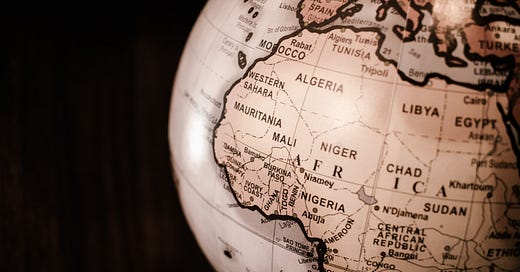Europe's influence in the World
The war in Ukraine modified the European perspective on its influence outside of the continent. Is the EU's influence shrinking? And who are her main rivals?
The war in Ukraine modified the European perspective on its influence outside of the continent. Is the EU's influence shrinking? And who are her main rivals?
Before you dive into this piece, why don’t you subscribe to the Beubble? It’s free, and you will receive bi-weekly insights into Europe’s politics and policies.
Increasing challenges in Africa
The most important theatre of operation to understand the relative strength of Europe and its rivals is, without a doubt, the African continent.
Once largely under the domination of European colonial powers, African nations gradually gained their independence from their European overlords over the last third of the 20th century. Although special relations with the former colonisers never stopped, the relationship between European and African states entered a more collaborative phase.
The first two decades of the 21st century showed greater collaborations between the two continents, mostly in terms of humanitarian aid and security/military support. More recently, however, Europeans are facing major setbacks in Africa. The main culprits are Russia and China.
China’s monopolistic influence over Africa
China’s strategy is motivated by its economic situation at home: as the country develops, it cannot rely on its cheap labour force and must resort to outsourcing its production to mostly untapped markets such as Africa. This gown hand in hand with an influence and security strategy.
China is virtually buying Africa. Its investment policy makes it difficult for African borrowers to repay the loans taken, and must then grant Chinese lenders the exclusive use of the infrastructures (mostly harbours, bridges, dams). With such important assets under Chinese control, the nations have no choice but to align diplomatically with China.
Russia’s hired guns
Russia’s strategy is less subtle but as effective and more violent. The mercenary Wagner group, controlled by a close ally of Vladimir Putin, is expanding Russia’s influence in Africa. According to reporter Declan Walsh for the New York Times:
[…] Wagner is far more than a simple guns-for-gold scheme. Operating through a sprawling web of shell companies, it has become a byword for a broad spectrum of Kremlin-backed operations in over a dozen African countries. Wagner meddles in politics, props up autocrats and orchestrates digital propaganda campaigns. It donates food to the poor and produces action movies set in Africa. It has even organized a beauty pageant.
Furthermore,
In West Africa, Russia is exploiting a growing wave of anti-French sentiment in countries like Mali, where the arrival of Wagner operatives led to a departure of French soldiers and diplomats this year.
Wagner, on behalf of the Kremlin, is seizing influence in African capitals, making sure these countries side diplomatically with Russia, notably refusing to apply Western sanctions against the aggressor of Ukraine.

The regulatory power of Europe
Despite the setbacks on the African front, there is a sector in which Europe remains a supergiant, stronger even than the United States. We European love to criticise it, but this is perhaps our greatest asset in an increasingly violent and unstable world: our regulatory power.
In The Brussels Effect: How the European Union Rules the World, author Anu Bradford writes:
Today, few Americans are aware that the EU regulations determine the default privacy settings on their iPhones or the type of speech that Twitter will delete as unacceptable. Americans are hardly alone in this regard. Examples of EU’s regulatory influence abound across global markets. EU laws determine how timber is harvested in Indonesia, how honey is produced in Brazil, what pesticides cocoa farmers use in Cameroon, what equipment is installed in dairy factories in China, what chemicals are incorporated in plastic toys in Japan, as well as how much privacy is afforded to internet users in Latin America.
The regulatory power of Europe is so influential, through global markets, that it can be used to advance Europe’s strategies around the globe. The EU’s ambition to become climate-neutral by 2050 will encourage the decarbonisation of other parts of the world. Other countries are adopting GDPR-like regulations, while traceability will ensure that less harmful chemicals are used in every industrial line, including outside of Europe.
Europe can use this tool in the global competition for influence. Its sanctions against the Russian war machine could be linked to doing business in Europe: no business would be allowed to invest in Europe if it does not respect the embargo on Russia that the EU agreed on, for instance.

Global market influence
Hopefully, this influence is more profound and long-lasting than Chinese or Russian strategies, since it is deeply rooted in the social market economy that prevails in Europe and most parts of the world. Even Russia, the birthplace of communism, and China, the only Marxist-Leninist global power left in the world, cannot resist the advance of the market economy.
Europe should uphold the rules of trade and economic collaborations. The EU should do its maximum to ensure that the WTO rules are respected and that commercial partners refuse to play unfair competition. The European Green Deal Industrial Plan is a great tool to promote European business standards in the world, but it should go hand in hand with a strategy for open collaboration with our partners, the first of which remains North America.
Thank you for reading The Beubble. Did you like this piece? Subscribe to receive bi-weekly news of EU politics and policies.





